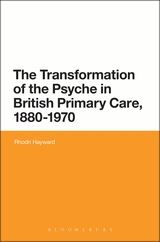Chris Millard, postdoctoral researcher at the Centre and one of the pioneers of the ‘Lost Emotions’ project, recently spent three months on secondment at the Parliamentary Office for Science and Technology, where he researched and wrote about the issues of ‘parity of esteem’ between physical and mental health. His work resulted in him co-authoring an editorial for the British Medical Journal, as well as writing a post for the history of emotions blog reflecting on the experience.
Monthly Archives: December 2014
New book: ‘The Transformation of the Psyche in British Primary Care 1880 – 1970’, by Rhodri Hayward
 The Centre is proud to announce the publication of a new book by Rhodri Hayward.
The Centre is proud to announce the publication of a new book by Rhodri Hayward.
Conflicting models of selfhood have become central to debates over modern medicine. Yet we still lack a clear historical account of how this psychological sensibility came to be established.
The Transformation of the Psyche in British Primary Care, 1880-1970 remedies this situation by demonstrating that there is nothing inevitable about the current connection between health, identity and personal history. It traces the changing conception of the psyche in Britain over the last two centuries and it demonstrates how these changes were rooted in transformed patterns of medical care. The shifts from private medicine through to National Insurance and the National Health Service fostered different kinds of relationship between doctor and patient and different understandings of psychological distress. The Transformation of the Psyche in British Primary Care, 1880-1970 examines these transformations and, in so doing, provides new critical insights into our modern sense of identity and changing notions of health that will be of great value to anyone interested in the modern history of British medicine.
Film Screening: Nostalgia for the Light (Patricio Guzmán, 2010)
Introduced by Dr Andrea Brady
Nostalgia for the Light is a documentary by Patricio Guzmán (The Battle of Chile, The Pinochet Case). In the arid landscapes of the Atacama Desert, Guzman encounters cutting-edge technologies for probing the origins of the universe, archaeologists recovering the remains of the 19th century, and women seeking out their dead, prisoners ‘disappeared’ after the military coup of 1973. The film contrasts these different investigations into place, memory, and the past, tragedy and rationality, science and kinship.
See also: 2014 Film Series flyer [PDF]
Film Screening: La Signora di Tutti (Max Ophüls, 1934)
Introduced by Adrian Garvey
Film melodramas, sometimes denigrated as ‘weepies’, are indelibly associated with emotion, both representing and evoking heightened states of love and loss. Active in Europe and Hollywood, German-born Max Ophüls (1902-57), who made such films as Letter From An Unknown Woman (1948) and Madame de… (1953), is among the most acclaimed directors of the genre. La Signora di Tutti was produced in Italy where Ophüls worked briefly as a refugee from Nazism. Narrated in flashback, the film relates the tempestuous romantic life of a film star, Gaby Doriot. Less widely seen than his later work, it demonstrates the director’s characteristic synthesis of motion and emotion, as the expressive fluidity of the mobile camera intensifies the action and our responses to it.
See also: 2014 Film Series flyer [PDF]
Film Screening: ‘Poppy Shakespeare’ (Benjamin Ross, 2008)
Introduced by Dr Elena Carrera
Poppy Shakespeare is Benjamin Ross’s award-winning Channel 4 film adaptation of Clare Allan’s novel about a psychiatric day hospital in North London. Its protagonist, N, is given the job of showing the ropes to the reluctantly admitted, self-declared ‘sane’ Poppy, who has to learn to play ‘mad’ to be able to afford a lawyer who might get her out. In showing the mirroring relationship between these two ill-fated women as they cross shifting boundaries between sanity and insanity, the film mobilizes the viewer’s sense of alienation, and poses crucial questions about the role of empathy in mental healthcare.
Tickets now available from eventbrite.
See also: 2014 Film Series flyer [PDF]
Film Screening: ‘Shame’ (Steve McQueen, 2011)
Introduced by Dr Katherine Angel
Shame is written and directed by Steve McQueen, Turner Prize-winning video artist and director of Hunger and 12 Years A Slave. Widely glossed (including by McQueen himself) as a film about sex addiction, Shame is a fine-grained portrait of sexual compulsion and suffering. Michael Fassbender plays Brandon, an office worker in New York in his mid-thirties whose routine is peppered with somewhat joyless pornography use, masturbation, the chasing of casual encounters, and visits from sex workers. Brandon’s sister (Carey Mulligan) comes to visit, which creates tensions in which Brandon’s suffering peaks. Shame is a film that reveals contemporary anxieties about pornography and addiction, while reflecting deftly on questions of humiliation, aggression, gender, and power.
See also: 2014 Film Series flyer [PDF]